Marketing
AI in B2B Marketing: 6 Ways to Improve Customer Experiences
Ekta Swarnkar
4/3/2024
0 min read
TABLE OF CONTENTS
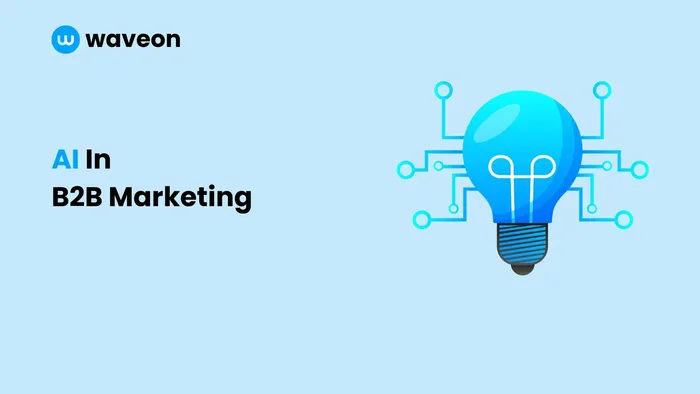
Today, B2B marketing teams face the problem of data surplus. They have 1000 times more customer data and ten times more marketing channels, but only 15% of companies have a unified data view.
To add more to it, B2B buyers are more informed. They want to educate themselves about product needs and expect brands to personalize experiences.
In an interview with LinkedIn, Vijay Chittoor, Co-founder of Blueshift, said, “Customer experience is the new battlefield for competitive advantage.” Brands that optimize customer experiences will win the battle, but how can they do it when there’s a lot of data to process with limited human resources?
While it’s far from true that artificial intelligence (AI) trumps human brains, AI is definitely better at analyzing large data sets to extract insights. AI is a marketing partner.
Today, B2B brands that use AI to collect, measure, and analyze data to extract meaningful insights and create personalized customer experiences are winning.
This post lists the top six ways B2B marketing teams use AI to win the marketing game. Each method includes real-life use cases and examples to help you shape your AI in B2B marketing strategy.
6 ways B2B marketing teams use AI to improve customer experience
AI has benefited B2B marketing teams in many ways, such as increasing productivity, eliminating repetitive tasks, and reducing human error. However, these are just added benefits; the real power of AI can be utilized only by combining it with human creativity.
Here are seven ways B2B brands use AI to achieve incredible results in terms of increase in production, revenue, and effectiveness:
#1. Data collection, unification, and analysis
AI is really powerful, but only with the right use of customer data. For decades, B2B marketing teams have been brilliant at collecting data from multiple data sources but not very effective at extracting meaningful insights from it.
The lack of integration and data integration are major reasons. Still, by combining artificial intelligence and platform integrations, B2B teams have created a common data repository for all uses.
For example, Segment is a platform that allows integration with 450+ data sources to gather, refine, and process customer data in one place.
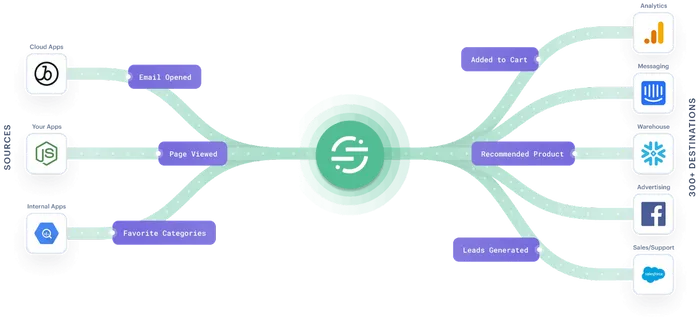
Data processing at a large scale, thanks to AI, helps in two major ways:
-
Lead scoring: By noticing customer engagement levels and scoring leads, sales teams prioritize efforts on the most valuable prospects while marketing teams focus on nurturing more MQLs.
-
Lead segmentation: Identify and segment similar customer patterns into groups to increase engagement and conversion rates.
Wrench.ai helped one of its clients increase ROAS and conversion rates by analyzing brand/product descriptions and key elements impacting the conversion process, including triggers, events, and targets. Then, the platform converted this data into audience segments used in marketing and sales methods for better results.
#2. Personalize customer journeys
Customers expect brands to understand their unique needs and expectations. In a Salesforce survey, 90% of customers reported that the brand's experience matters as much as the product or service.
That’s why companies optimizing for personalized customer experiences are ahead of companies still following mass targeting strategies. Platforms like Paperflite enable B2B brands to personalize content at scale.
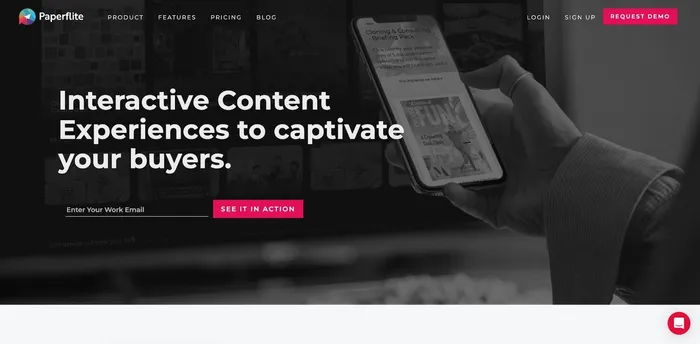
Paperflite collects, analyzes, and segments customer data based on various parameters like engagement, demographics, interests, etc. It allows companies to customize and personalize content based on this segmentation.
You can set up triggers to send personalized dynamic content to the right audience at the right time based on their engagement levels and interaction.
Freshworks, with the help of Cleverstory (a Paperflite product), built authority among big industry players, reduced cost-per-lead (CPL) by 70%, and increased returning visitors by 26% by creating unified, personalized experiences. These campaigns targeted emotional aspects instead of stating functional benefits.
#3. Predictive recommendations
Machine learning-based predictive recommendation for content personalization is a perfect use case of AI in B2B marketing. AI can analyze historical data to predict future trends based on customer interaction and interests.
B2B marketing teams use predictive AI in two significant ways:
-
Behavioral marketing: Identifying patterns or trends from past customer interactions leads to accurately predicting future customer behavior. Salesforce Einstien Analytics uses CRM data to predict customer behavior so marketing and sales teams can optimize their messages.
-
Content personalization: Marketing teams can use predictive AI to create customized content experiences tailored to customers’ tastes. Sailthru sends personalized, curated newsletters to subscribers based on their interests.
Behavioral marketing lead campaigns for a B2B company in the consumer foods industry resulted in an 86% increase in new lead outreach, a 38% reduction in funnel leaks, a 22% increase in customer order renewals, and a two-month and two-week sales cycle shortened. Deal value also increased by 17%.
#4. Automating customer interactions
B2B customers like to educate themselves before booking a product demo or sales call. As a company, you must be ready and available to answer audience questions to provide a seamless pre-onboarding experience.
Website visitors are more likely to become customers when they find it easier to engage with your brand before investing. So, how can B2B brands use AI to engage with lurkers who can become future customers?
AI-powered chatbots that answer common audience questions, connect to sales reps for technical queries, and automatically book sales and demo calls with users' consent can be used. For example, Drift, a conversational AI chatbot with GPT features to generate automated replies, can be used.
Combining chatbots with AI enables them to keep learning and improving response quality. Your company documentation, help center, and other resources can guide these chatbots to help website visitors get answers quickly without waiting for a sales representative.
#5. Content production at scale
More content replicates to better brand recognition, authority, and engagement, leading to more demo requests, sales calls, and customers.
But, creating quality content has always been a time-consuming process. However, with AI tools like ChatGPT, B2B writers can increase their output, and brands can speed up final touches like editing before publication.
ChatGPT can be trained on brand guidelines, so the more you train the AI, the better it gets at getting the work done. Tools like Content@Scale help produce good-quality content at scale. Of course, AI tools can’t replace human writers because they add their creativity factor to content pieces, but these can help create quality content at scale.
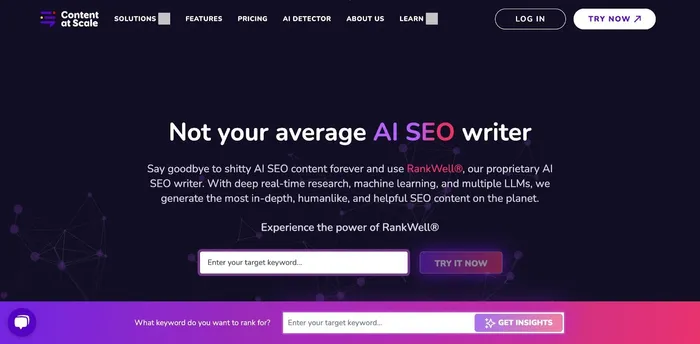
Pro tip: Always get AI content reviewed and edited by human writers to ensure it’s not entirely AI-generated. Only high-quality content will get you the signups and brand recognition you’re looking for, and risking quality for quantity is not a solution.
#6. Marketing automation with campaign optimization
The difference between AI and marketing automation is that AI uses machine learning to improve performance over time and predict what to do next. Automation is simply machines doing repetitive tasks without any improvement.
In B2B, marketing automation combined with artificial intelligence can improve outcomes. AI collects data, learns over time, and makes better predictions, while marketing automation eliminates repetitive tasks to allow B2B marketers to create optimized campaigns.
For example, HubSpot’s powerful AI and CRM features.
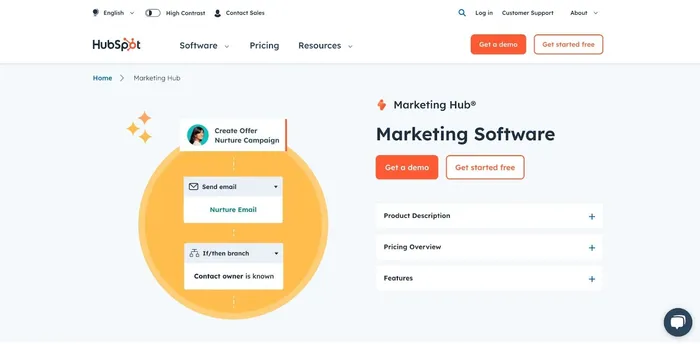
HubSpot leverages AI within its CRM to create effective campaigns by offering predictive lead scoring, personalized content recommendations, and automated workflows. This integration allows B2B brands to target high-quality leads, deliver tailored content, and optimize marketing strategies based on data-driven insights, resulting in increased engagement and conversions.
Should you use AI in B2B marketing?
It shouldn’t be a question anymore. AI is a must-have in B2B marketing. Brands that use it creatively and strategically will have an edge over those that don’t.
With data exponentially growing and the need for personalized experiences, AI offers businesses a powerful solution for scaling their marketing efforts while delivering exceptional customer experiences.
With these AI use cases in B2B marketing, you’re well-equipped for the future. However, you should start exploring the various uses of AI and integrate it into your marketing strategies to stay ahead of the curve.












